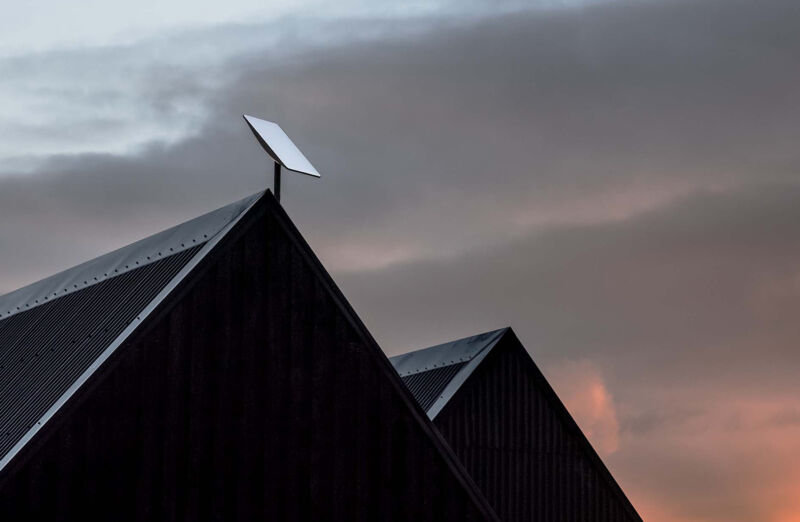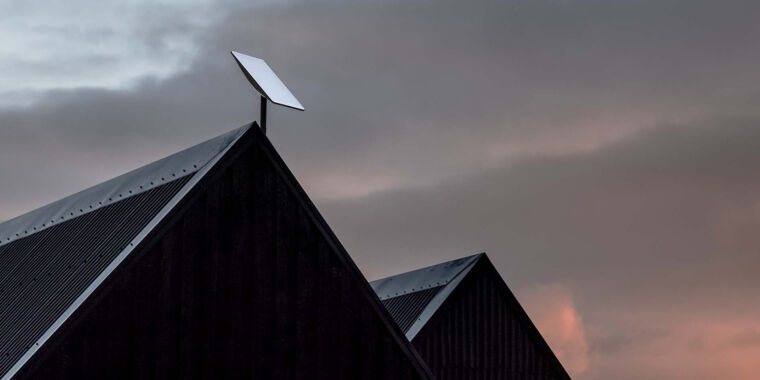
Starlink
SpaceX’s Starlink division is planning a new ruggedized satellite dish that can operate in hotter and colder temperatures. This is the second ruggedized Starlink dish the company has revealed—the first is designed for vehicles, ships, and aircraft, while the newer one is a fixed earth station that would provide broadband to buildings.
SpaceX asked the Federal Communications Commission for permission to deploy the “high-performance fixed earth stations” (or “HP terminals”) in an application filed Friday. PCMag wrote an article about the application yesterday.
“Compared to other user terminals SpaceX Services has been authorized to deploy, the HP model has been ruggedized to handle harsher environments so that, for example, it will be able to continue to operate at greater extremes of heat and cold, will have improved snow/ice melt capabilities, and will withstand a greater number of thermal cycles,” SpaceX told the FCC. SpaceX said its application should be approved because the terminals will extend the Starlink network to “a range of much more challenging environments.”
“Granting this application would serve the public interest by authorizing a new class of ground-based component for SpaceX’s satellite system that will enhance the range of broadband capabilities available throughout the United States—and most particularly, to those in challenging environments where ruggedization is appropriate… Operation under the requested blanket license will provide the first option for some and promote competition for others in the market for broadband services,” SpaceX wrote.
Terminals sometimes go into “thermal shutdown”
The existing Starlink user terminals go into “thermal shutdown” once they hit 122° Fahrenheit, which has caused outages for some users. The standard Starlink dishes for home Internet users—both the original and the newer rectangular model—have an operating temperature range of -22°F to +122°F (-30°C to +50°C).
It’s not clear whether the new ruggedized terminal is only intended for business users or if it would also become an option for home users. SpaceX’s radiation hazard analysis suggests that it will be deployed in a variety of customer scenarios but places an emphasis on enterprise customers. “Some HP terminals will be deployed in Occupational/Controlled Environments, especially for enterprise customers,” it says. While “many installations will be made in areas that are inaccessible to the public… some HP terminals will likely be deployed in General Population/Uncontrolled Environments as well,” SpaceX wrote.
“Accordingly, SpaceX Services will deploy two versions of these terminals that differ only in the software that determines their maximum duty cycle, and will ensure that the higher duty cycle is only deployed in areas that are not accessible to the general public,” SpaceX wrote.
The exact operating temperature range of the planned HP terminals also isn’t clear. We asked SpaceX questions about the terminal’s operating temperature and its potential for home use today and will update this article if we get a response.
Besides the ruggedization features, the new HP terminals “will operate with higher gain and lower transmit power (thus maintaining a consistent EIRP [Effective Isotropic Radiated Power] compared to other SpaceX Services user terminals), [and] a higher scan angle,” SpaceX’s application said.
Preorders delayed
A more pressing question for people who ordered Starlink and haven’t received it yet is when they’ll finally receive the existing user terminal. SpaceX recently warned that “silicon shortages have delayed production which has impacted our ability to fulfill orders,” and preorder estimates for some people were pushed out to 2023.
A report on Insider this week said the news site “spoke to more than ten people who have waited nearly 12 months for Starlink’s Internet service” and learned that the preorderers “have received no updates from Elon Musk’s company on when Starlink will be available in their area and if the kit is on its way.”








